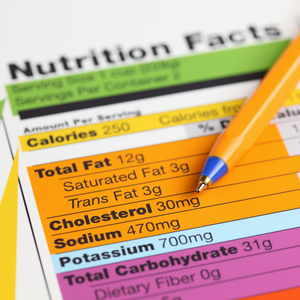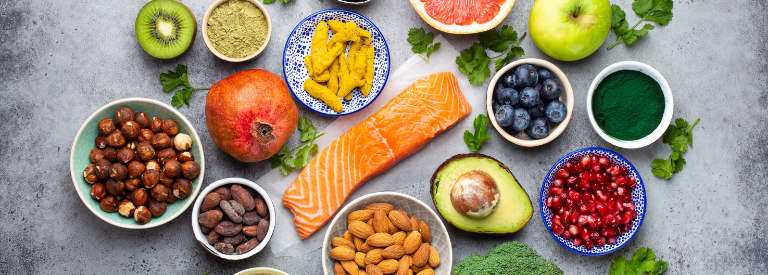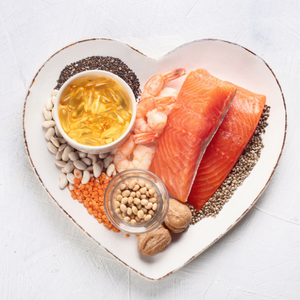A concept that originated in Japanese culture in the 1980s, it’s thought that food has 3 purposes:
- Primary - nourish the body and continue life processes.
- Secondary - provide taste, texture, and smell.
- Tertiary - change physiological properties in a positive way.
If the food falls under the tertiary purpose, then it's considered a functional food. Functional foods are ingredients that can positively affect health apart from their basic nutritional value. Not only do these kinds of foods provide fundamental nutrients, but they also promote optimal health and help reduce the risk of disease. If not consumed as advised, these functional foods could be toxic. 
Types of Functional Foods
Functional foods can be divided into two categories depending on nutritional values and benefits, and whether the nutrients are naturally found in the food. Regardless of the category of functional food, its benefits are essential in your everyday diet to improve digestive, immune, or cardiovascular health.
Conventional Functional Foods
Conventional functional foods are natural, whole-food ingredients that are rich in nutrients like vitamins, minerals, antioxidants, and healthy fats. Below are prime examples of conventional functional foods you may often come across on a daily basis:
- Fruits:
- Kiwis
- Pears
- Apples
- Berries
- Peaches
- Oranges
- Bananas
- Vegetables:
- Kale
- Spinach
- Broccoli
- Zucchini
- Cauliflower
- Nuts:
- Almonds
- Cashews
- Pistachios
- Brazil nuts
- Macadamia nuts
- Seeds:
- Flax
- Chia
- Hemp
- Pumpkin
Modified Functional Foods
To increase health benefits, modified functional foods have been fortified with added ingredients like vitamins, minerals, probiotics, or fiber. Fortified foods are generally seen as common products you consume every day such as:
- Fortified eggs
- Fortified juices
- Fortified cereal and granola
- Fortified grains - bread and pasta
- Fortified dairy products - milk and yogurt
- Fortified milk alternatives - almond, rice, coconut, and cashew milk

What Benefits Do Functional Foods Have?
These nutrient-packed foods exist to nourish us with vitamins, minerals, and micronutrients that are important for our bodies functions. If you don’t produce enough, they need to be introduced through your diet. Incorporating functional foods onto your plate can help you reap the health benefits of the three main advantages.
1. Prevent Nutrient Deficiencies
High in important nutrients, functional foods – whether conventional or fortified – can help provide all the nutrients needed to avoid deficiencies. Since the introduction of fortified functional foods, nutrient deficiencies like iron, iodine, vitamin D, and vitamin B12 deficiencies have exponentially decreased worldwide. The fortification of foods has also been useful in preventing other conditions linked to nutrient deficiencies such as goiter, congenital disabilities, and rickets.
2. Protect Against Disease
While many of these foods are rich in antioxidants, their molecules also help neutralize harmful compounds to prevent cell damage and chronic conditions like heart disease, cancer, and diabetes. Some functional foods are high in omega-3 fatty acids that reduce inflammation, boost brain function, and promote heart health. Ingredients rich in fiber can promote better blood sugar control and protect against diabetes, obesity, heart disease, and stroke. Fiber also helps prevent digestive conditions like stomach ulcers, hemorrhoids, and acid reflux.
3. Promote Proper Growth And Development
Including fortified foods in a healthy diet is important for growth and development. Foods fortified with folic acid like cereals, grains, and flours are essential for fetal health. Other nutrients found in functional foods include omega-3 fatty acids, iron, zinc, calcium, and vitamin B12 which are vital in growth and development.
Common Substances In Functional Foods
When browsing through the aisles of the supermarket, many items can be labeled as “50% more protein,” an “excellent source of potassium, calcium, and vitamin D,” or “mineral-enriched.” While this sounds appealing, it’s important to note the substances' purpose and how they affect your body.
- Beta-glucans: lower blood cholesterol levels
- Probiotics: supply beneficial bacteria to the colon
- Prebiotics: nourish the beneficial bacteria in the colon
- Flavonoids and antioxidants: protect cells against oxidative stress
-
Omega-3 and omega-6: affect the regulation of blood pressure, kidney function, and immune system

How To Consume Functional Foods
The trendiest and most commonly seen method of everyone achieving their serving of functional foods is through fresh juices, thick smoothies, or decorated smoothie bowls. A large portion of functional foods are fruits and vegetables, and while they can all be incorporated into at least one of the daily meals, the option of drinking your vitamins and minerals for the sake of convenience and on-the-go friendliness has taken off. Juice bars are the primary places to find a quick and easy way to add some functional foods into your routine without searching for fresh fruits or vegetables in the store.
Difference Between Functional Foods And Superfoods
Superfoods, while very similar to functional foods, are typically exotic foods that are highlighted as health-conscious and contain a lot of nutrients. They are mainly minimally processed or unprocessed completely, so the chance of consumption being toxic is slim. The main difference is that superfoods don't necessarily promote direct health benefits, although they offer vital nutrients and can be considered healthy. But the word superfood itself is mostly a buzzword for marketing purposes. Some of these trendy superfoods are now commonly seen on the menus of smoothie shops, juice bars, or coffee shops such as:
- Acai
- Goji
- Spirulina
- Kale
- Quinoa
- Turmeric
- Ginger
A Functional Food A Day Keeps The Doctor Away
Fit for consumers’ busy lifestyles and on-the-go eating, functional foods facilitate the method by which we receive our essential vitamins and micronutrients. Whether conventional or modified, these everyday ingredients manage to protect us from deficiency conditions, prevent health diseases, and keep us strong. So next time you go grocery shopping, consider buying that protein-enriched soy milk or antioxidant-filled juice.








